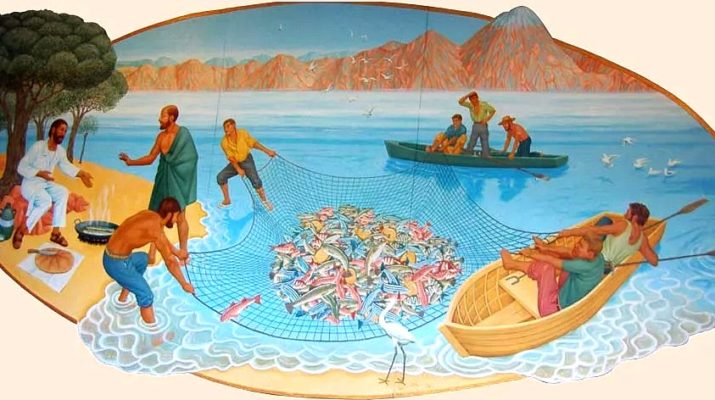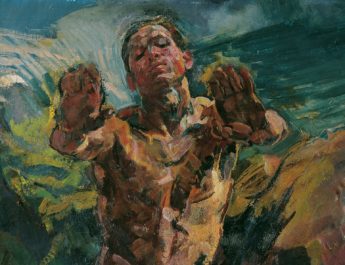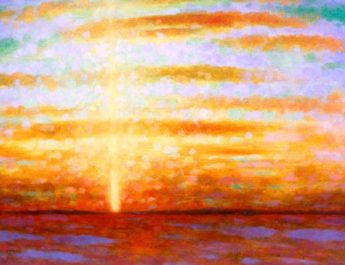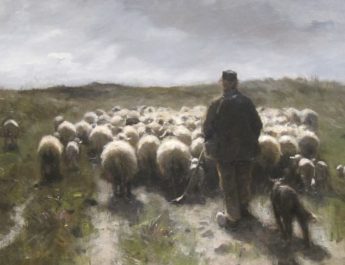John 21:4-14
Easter Thursday – A Women’s Lectionary
4 AJust after daybreak,B JesusC stoodD on the beach;E
A {untranslated} = ginomai. This is to come into being, to happen, become, be born. It can be to emerge from one state or condition to another or is coming into being with the sense of movement or growth.
B “daybreak” = proia. 2x in NT. From proios (early morning); from proi (early, at dawn, during the daybreak watch); from pro (before, earlier than, ahead, prior). This is early morning.
C “Jesus” = Iesous. From Hebrew Yehoshua (Joshua, the Lord is salvation); {from YHVH (proper name of the God of Israel; the self-existent and eternal one); {from havah (to become) or from hayah (to come to pass, become, be)} + yasha (to deliver, defend, help, preserve, rescue; properly, to be open, wide or free, which implies being safe. So, in a causative sense, this is to free someone)}. This is Jesus or Joshua in Greek – the Lord saves or the Lord is salvation.
D “stood” = histemi. This is to stand, place, establish, appoint, stand ready, be steadfast.
E “beach” = aigialos. 6x in NT. From aix (a wave) OR from aisso (to rush) + hals (sea, salt, a boy of saltwater). This is the seashore, a sandy beach, or land.
but the disciplesF did not knowG that it was Jesus. 5 Jesus said to them, “Children,H you haveI no fish,J have you?”
They answered him, “No.”
F “disciples” = mathetes. From matheteuo (to make a disciple of); from manthano (to learn key facts, gain knowledge from experience; generally implies reflection as part of the learning process); from math– (thinking things through). This is a disciple, learner, or student. It is where we get “mathematics” from.
G “know” = eido. This is to know, consider perceive, appreciate, behold, or remember. It means seeing with one’s eyes, but also figuratively, it means perceiving – seeing that becomes understanding. So, by implication, this means knowing or being aware.
H “children” = paidion. From pais (child, youth, servant, slave); perhaps from paio (to strike or sting). This is a child as one who is still being educated or trained. Perhaps one seven years old or younger. Used figuratively for an immature Christian.
I “have” = echo. This is to have, hold, possess.
J “fish” = prosphagion. 1x in NT. From pros (at, to, toward, with) + phago (to eat, devour, consume; eat in a literal or figurative sense). This is something eaten with bread, generally refers to fish or meat. It could also be relish.
6 He said to them, “CastK the netL to the rightM sideN of the boat,O and you will findP some.”
K “cast” = ballo. This is to throw, cast, rush, place, or drop. It is throwing, but it could be with more or less velocity and with more or less force/violence.
L “net” = diktuon. 12x in NT. From dikein (to cast); probably from diko (to cast). A fishing net or any net used in hunting.
M “right” = dexios. Perhaps from dechomai (to warmly receive, be ready for what is offered, take, accept, or welcome; to receive in a literal or figurative sense). This is right, right side, or the right hand.
N “side” = meros. From meiromai (to get your allotment or portion). This is a part, a share, or a portion.
O “boat” = ploion. From pleo (to sail, voyage); probably from pluno (to plunge – so to wash); from pluo (to flow). This is a boat, ship, or vessel.
P “find” = heurisko. This is to find, learn, or obtain. It is to discover something, which generally implies a period of searching for it. This is to find in a literal or figurative sense. This is where the word “heuristic” comes from.
So they cast it, and now they were not ableQ to haulR it in because there were so manyS fish.T
Q “able” = ischuo. Related to “have” in v5. From ischus (strength, might, power, force, ability; power that engages immediate resistance); {from is (force) + echo (see note I above)}. This is to be strong or have power. It can also refer to being healthy and vigorous. Further, it can mean to prevail. It is strength in action against resistance, exercising force in a literal or figurative sense.
R “haul” = helko. 8x in NT. Perhaps from haireomai (to take, choose, or prefer) {probably related to airo (raise, take up, lift, remove)}. This is to pull in or draw in. It can be drag in a literal or figurative sense. This places an emphasis on the power of the attraction.
S “so many” = plethos. From pletho (to fill, accomplish, supply; to fill to maximum capacity). This is fullness, multitude, great number.
T “fish” = ichthus. This means fish. It was also an early, secret Christian symbol – the “sign of the fish.” It was short for “Jesus Christ, Son of God, Savior” in Greek. See https://en.wikipedia.org/wiki/Ichthys
7 That disciple whom Jesus lovedU said to Peter,V “It is the Lord!”W When SimonX Peter heardY that it was the Lord,
U “loved” = agapao. Perhaps from agan (much). This is love, longing for, taking pleasure in. It is divine love or human love that echoes divine love.
V “Peter” = Petros. Related to petra (large rock that is connected and or projecting like a rock, ledge, or cliff; can also be cave or stony ground). This is Peter, a stone, pebble, or boulder.
W “Lord” = Kurios. From kuros (authority, supremacy). This is a respectful address meaning master or sir. It refers to one who has control or power greater than one’s own. So, it was also applied to God and Jesus as Master or Lord.
X “Simon” = Simon. From Hebrew Shimon (Simon – Jacob’s son and his tribe); from shama (to hear, often implying attention and obedience). This is Simon, meaning “he who hears.”
Y “heard” = akouo. This is hear or listen, but it also means to understand by hearing. This is where the word “acoustics” comes from.
he put onZ some clothes,AA for he was naked,BB and jumpedCC into the sea.DD
Z “put on” = diazonnumi. 3x in NT. From dia (through, for the sake of, across, thoroughly) + zonnumi (to gird, prepare for an active task; to gird up your loins so that you are able to move fast); {perhaps from zone (belt, waistband, purse); probably related to zugos (yoke, set of scales; what unites people in shared work; servitude or obligation); from zeugnumi (to yoke)}. This is to tie or gird around.
AA “clothes” = ependutes. 1x in NT. From ependuomai (to clothe oneself aptly, have a garment on over); {from epi (on, upon, to, against, what is fitting) + enduo (to clothe, put on in a literal or figurative sense); {from en (in, on, at, by, with, within) + duno (to enter, sink into; can also be set like the sun); {from duo (to sink)}}}. This is an outer tunic, any kind of outer garment, a coat.
BB “naked” = gumnos. 15x in NT. This is naked. Generally, it refers to someone who is not completely clothed i.e. only wearing the undergarment and not the complete attire for going out. Rarely, it can mean completely naked. It can be naked in a literal or figurative sense – open, bare, ill-clad. This is where “gymnasium” comes from.
CC “jumped” = ballo. Same as “cast” in v6. See note K above.
DD “sea” = thalassa. Related to “beach” in v4. Perhaps from hals (see note E above) or halas (salt; can be figurative for prudence). This is the sea, a lake, or seashore.
8 But the otherEE disciples cameFF in the boat,GG draggingHH the net full of fish,
EE “other” = allos. This is other, another. Specifically, it is another of a similar kind or type. There is a different word in Greek that speaks of another as a different kind (heteros).
FF “came” = erchomai. This is to come or go.
GG “boat” = ploiarion. Related to “boat” in v6. 5x in NT– all in the gospels. From ploion (see note O above). This is a little boat or vessel.
HH “dragging” = suro. Related to “haul” in v6. 5x in NT. Perhaps related to haireomai (see note R above). This is to drag, force away, or trail.
for they were not farII from the land,JJ only about a hundredKK yardsLL off.
II “far” = makran. 9x in NT. From makros (long, long lasting); from mekos (length); probably related to megas (great or large). This is far off, remote, far away in a literal or figurative sense.
JJ “land” = ge. This is earth, land, soil, region, country, the inhabitants of an area.
KK “hundred” = diakosioi. 8x in NT. From dis (twice, utterly, again); {from duo (two, both)} + hekaton (hundred or hundredfold). This is two hundred.
LL “yards” = pechus. 4x in NT. This is forearm or cubit, a unit measuring around a foot and a half.
9 When they had goneMM ashore,NN they sawOO a charcoal firePP there,QQ
MM “gone” = apobaino. 4x in NT. From apo (from, away from) + baino (to walk,). This is to go out, become, happen, disembark.
NN “ashore” = ge. Same as “land” in v8. See note JJ above.
OO “saw” = blepo. This is literally to see – it is primarily used in the physical sense. However, figuratively it can be seeing, which includes attention and so to watchfulness, being observant, perceiving, and acting on the visual information. It can also mean beware.
PP “charcoal fire” = anthrakia. 2x in NT– here and during Holy Week when Peter is in the courtyard, while Jesus is being questioned. From anthrax (coal, a live coal). This is burning coals piled together. This is where the words “anthrax” and also “anthracite” come from.
QQ “there” = keimai. This is to lie, recline, be set, appointed, destined. It is to lie down literally or figuratively.
with fishRR onSS it, and bread.TT
RR “fish” = opsarion. 5x in NT. Diminutive of opson (cooked food) OR from optos (roasted, cooked); {related to hepso (to steep)}. This is fish or little fish. It can also refer to a cooked sauce or salted fish served as a condiment.
SS “on” = epikeimai. Related to “there” in v9. 7x in NT. From epi (on, upon, what is fitting) + keimai (see note QQ above). This is to lie up, impose, insist, oblige, press on.
TT “bread” = artos. Related to “haul” in v6 & “dragging” in v8. Perhaps from airo (see note R above). This is bread or a loaf. It is a loaf as raised.
10 Jesus said to them, “BringUU some of the fishVV that you have just caught.”WW
UU “bring” = phero. This is to bear, bring, lead, or make known publicly. It is to carry in a literal or figurative sense.
VV “fish” = opsarion. Same as “fish” in v9. See note RR above.
WW “caught” = piazo. 12x in NT. From piezo (to press down or together, to pack) OR related to biazo (to force, use power to seize); {from bia (strength, force, violence) or bios (life, livelihood, goods, wealth)}. This is to take, catch, squeeze, capture from hunting, or arrest. This is the root of “piezoelectricity.”
11 So Simon Peter went aboardXX and hauled the net ashore, fullYY of largeZZ fish,AAA
XX “went aboard” = anabaino. Related to “gone” in v9. From ana (up, back, among, again, anew) + the same as basis (step, hence foot; a pace); {from baino (see note MM above)}. This is to come up in a literal or figurative sense – ascent, rise, climb, enter.
YY “full” = mestos. 9x in NT. This is filled with in a literal or figurative sense.
ZZ “large” = megas. This is big in a literal or figurative sense – great, large, exceeding, abundant, high, mighty, perfect, strong, etc.
AAA “fish” = ichthus. Same as “fish” in v6. See note T above.
a hundredBBB fiftyCCC-threeDDD of them; and though there were so many, the net was not torn.EEE
BBB “hundred” = hekaton. Related to “hundred” in v8. 17x in NT. See note KK above.
CCC “fifty” = pentekonta. 7x in NT. From pente (five) + deka (ten or -teen). This is fifty.
DDD “three” = treis. This is three.
EEE “torn” = schizo. 11x in NT. This is to split, divide, tear, sever; split in a literal or figurative sense. This is where the word “schism” comes from and also “schizophrenia” (literally “split mind”).
12 Jesus said to them, “ComeFFF and have breakfast.”GGG Now none of the disciples daredHHH to askIII him, “Who are you?” because they knew it was the Lord.
FFF “come” = deute. 12x in NT. From deuro (come here, hither, hence, now, until now). This is come, follow – as an exclamatory mood.
GGG “have breakfast” = aristao. Related to “haul” in v6 & “dragging” in v8 & “bread” in v9. 3x in NT. From ariston (breakfast or lunch; literally not having a boundary); {perhaps from eri (early) + ed (to eat) or from airo (see note R above)}. This is to have breakfast or lunch. It is the meal one has in about the middle of one’s day. It can be at any time before evening supper.
HHH “dared” = tolmao. 16x in NT. From tolma (boldness); perhaps from telos (an end, aim, purpose, completion, end goal, consummation, tax); from tello (to start out with a definite goal in mind). This is to show courage to take a risk, to venture decisively, to put it on the line for something that matters.
III “ask” = exetazo. 3x in NT. From ek (from, from out of) + etazo (examine). This is to inquire, examine thoroughly, meticulously. It can also be ascertain or interrogate.
13 Jesus came and tookJJJ the bread and gaveKKK it to them, and did the same with the fish.LLL
JJJ “took” = lambano. It does not refer to passive receiving of something, but active acceptance or taking of something whether it is offered or simply nearby. It focuses on individual decision and action.
KKK “gave” = didomi. To give, offer, place, bestow, deliver. This is give in a literal or figurative sense.
LLL “fish” = opsarion. Same as “fish” in v9. See note RR above.
14 This was now the third timeMMM that Jesus appearedNNN to the disciples after he was raisedOOO from the dead.PPP
MMM “third time” = tritos. Related to “three” in v11. From treis (see note DDD above). This is third.
NNN “appeared” = phaneroo. From phaneros (visible, apparent, clear, shining); from phos (light, a source of light, fire, or radiance; light with specific reference to what it reveals; luminousness whether natural or artificial, abstract or concrete, literal or figurative); from phao (to shine or make visible, especially with rays of light); from the same as phaino (to bring light, cause to appear, shine, become visible or clear). This is to make visible or clear, to make known. Properly, it is to illumine and so to make apparent or bring into open view.
OOO “raised” = egeiro. This is to awake, raise up or lift up. It can be to get up from sitting or lying down, to get up from sleeping, to rise from a disease or from death. Figuratively, it can be rising from inactivity or from ruins.
PPP “dead” = nekros. Perhaps from nekus (corpse). This is dead of lifeless, mortal, corpse. It can also be used figuratively for powerless or ineffective. It is where the word “necrotic” comes from.
Image credit: “Breakfast on the Beach” by Peter Koenig, 20th century.




